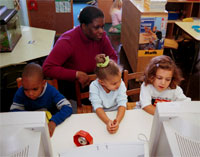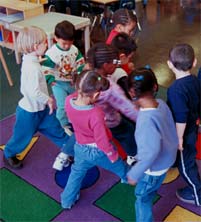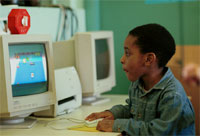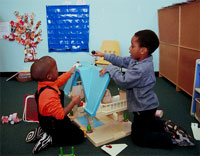 |
The Learning Ladder
|
| Module 2: The Role of Play | ||||
| Part 1 | Part 2 | Part 3 | Part 4 | Part 5 |
The Stages of Play
Children discover and learn about their world when they play. Play develops imagination and creativity and gives children practice in the social skills they need in our world. Children do not play for reward or because someone told them that it is good to do. They play because they like it. Children learn the skills of socializing with one another in social play. By playing with one another, children learn social rules such as waiting, taking turns, cooperation and sharing things. Children go through stages of play as they grow.
Look at the examples of the developmental stages of play below.
Solitary Play
|
Parallel Play Children are playing the same game or activity. They are playing next to each other, but they are not talking or doing the same activity. 
|
 Associative Play Children are playing the same game, but they are not working together or connecting with one another. |
|
Examples of activities within the developmental stages of play are:
solitary play: a child playing with blocks alone in a corner.
parallel play: two or more children playing with blocks near each other but not talking with each other.
associative play: two or more children playing with blocks building the same thing, talking with each other but not working together to create something.
cooperative play: two or more children are playing with blocks building the same thing, talking with each other and working together to create something.
| Did you finish? Then, go to the activities for Part 2. | |


